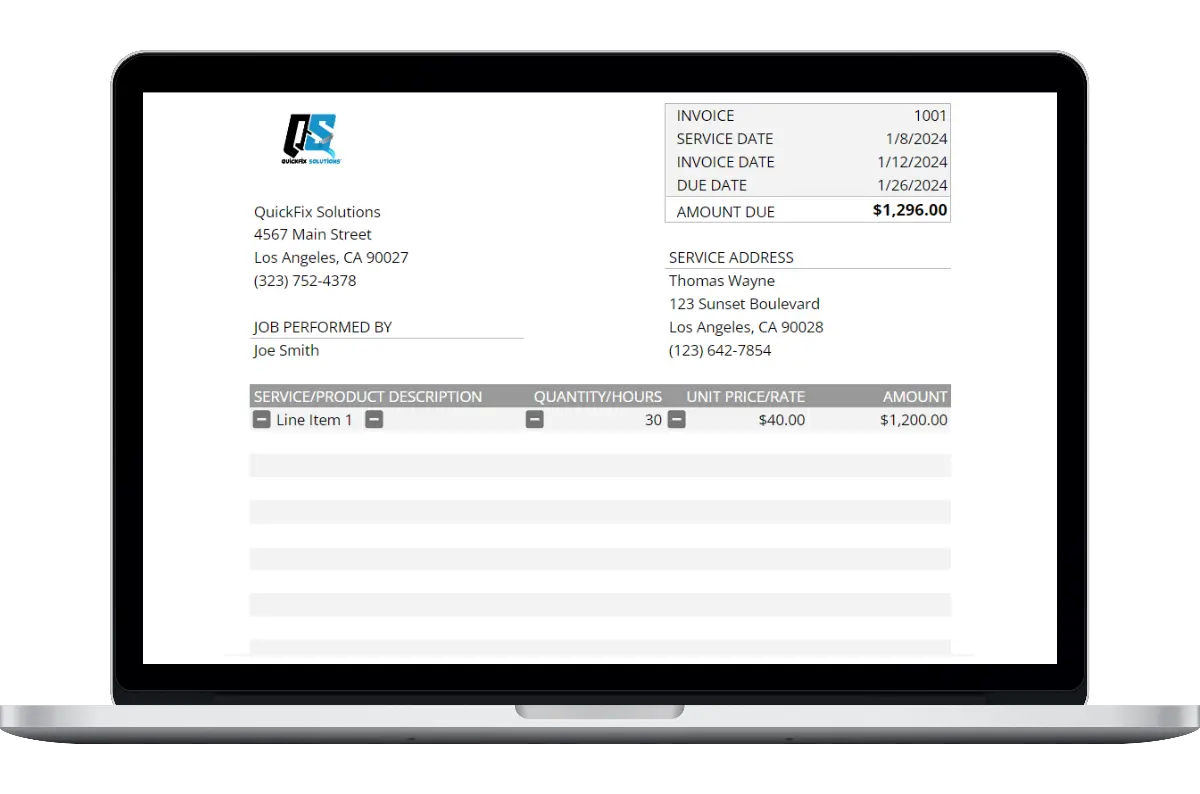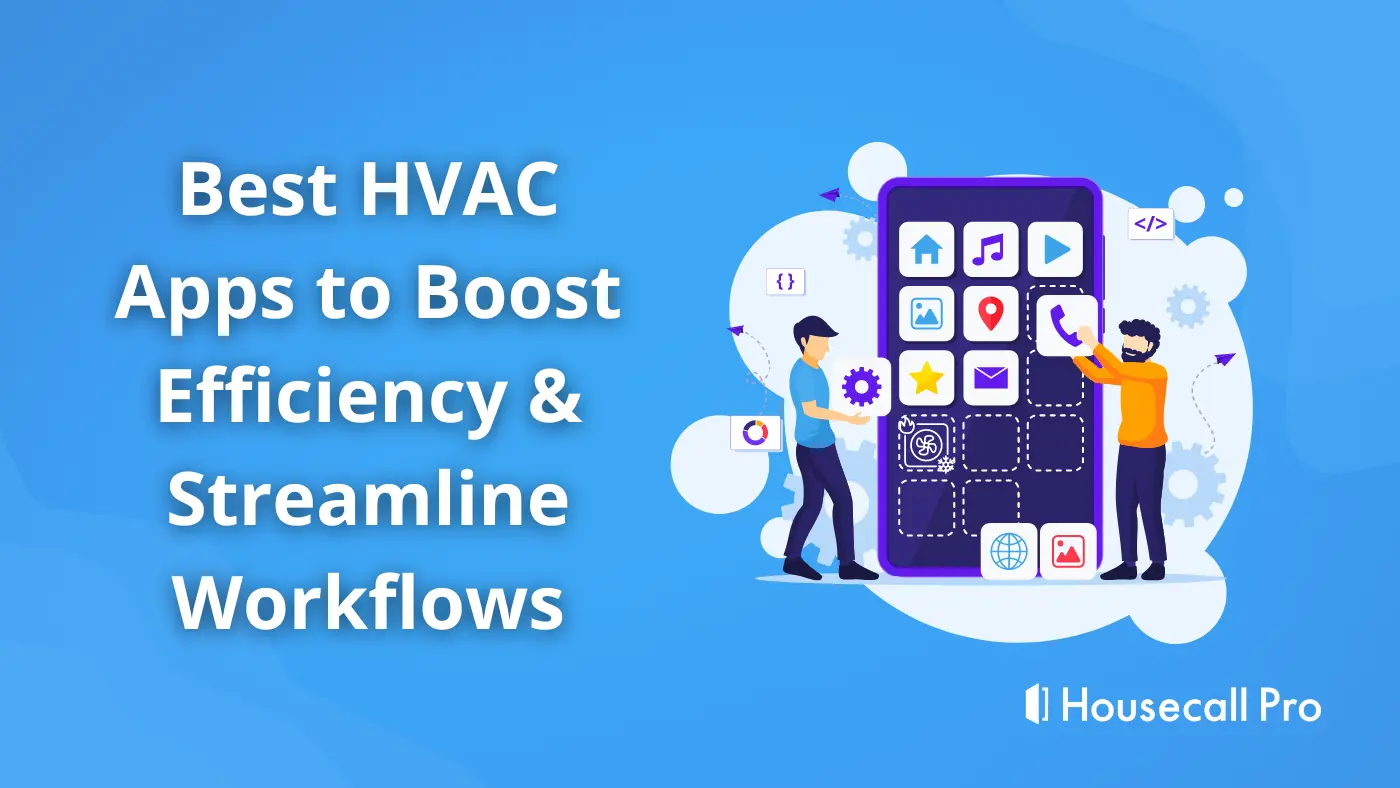
When clients shop around for a cleaning company, the stakes are high. Inviting a stranger into their private space to clean is a deeply personal experience, and clients want nothing more than to hire a reputable business they can trust. If you’re starting a new cleaning business or running a well-established cleaning company, hiring the right people is key to building your reputation and maintaining those relationships down the line.
Curious to know how other successful cleaning companies manage their employees and gain new and repeat clients? The answer is simple. They turn to Housecall Pro’s top-rated field service management software.
Our convenient all-in-one platform is designed to help service businesses stay organized, manage clientele, and improve profitability. Keep reading to learn more about how Housecall Pro can help your cleaning business unlock its true potential and achieve new heights.
- What to Know About Hiring Employees for Your Cleaning Business
- 1. Establish Business Needs
- 2. Define Your Ideal Candidate
- 3. Ready Your Business for Hiring
- 4. Attract the Right Candidates
- 5. Screen Applications
- 6. Interview Potential Candidates
- 7. Conduct Follow-up Interviews
- 8. Verify Criminal Background & References
- 9. Send an Offer Letter
- 10. Begin Onboarding & Training
- 11. Utilize the Probationary Period
- 12. Manage Employee Retention & Turnovers
- Your Cleaning Business Solution
What to Know About Hiring Employees for Your Cleaning Business
Between setting competitive pricing to offering specialized services, it takes a lot to start and run a cleaning business. And now that you’re ready to get the hiring underway, you’ll want to make sure you recruit quality candidates for the job.
Having an effective hiring strategy is an absolute must to ensure you’re doing your part to establish a long-lasting professional relationship. That’s why we’re taking a deep dive into everything you need to know about hiring employees for your cleaning business.
1. Establish Business Needs
To grow your staff and scale your business, it helps to know what you need and what you have to work with. There are several factors to think about, here are a few to get you started.
Budget
Employee wages aren’t the only thing to consider for your budget. From holding additional insurance policies to purchasing extra equipment, having a firm grasp on the budget is central to formulating and executing a successful hiring strategy.
Timeframe
The longer your job posting is open, the more applicants you will have to screen, interview, etc. Unless you have a hiring manager, it’s important to understand that the hiring process will impact your availability. Consider how much time you can allocate to your hiring endeavors and stick to that schedule.
Benefits
If your company offers employee benefits, you should account for the additional costs in your budget. Ask yourself these questions: Do you have employee incentives? What is the policy on accruing and using paid time off? What’s the additional cost of adding more people to your existing benefits program?
Bottom line
Every decision you make as a business owner should be made with this in mind. Hiring employees is essential to growing your cleaning business, and although it may require some patience and investment, it’s only a matter of time before your efforts pay off.
2. Define Your Ideal Candidate
Now that you’ve identified your business needs, think about your ideal candidate and the qualities your new hire will possess. If you’re unsure, consider these factors and write down your must-haves and red flags.
Experience & skillset
One of the most influential factors when hiring for your cleaning business is a candidate’s experience and skill set. Hiring someone with little to no experience means they are a blank slate, free of bad habits, but will require more time and attention for training. On the other hand, someone with broader experience will take less time to train and adapt to the workflow and will likely be more efficient than someone new to the cleaning industry.
Availability
Most business owners would agree their ideal candidate would have complete open availability, but life happens. Determine the minimum availability to meet the business needs and gauge if you have wiggle room to make accommodations. Are you willing to be flexible with a candidate who checks other boxes on the list?
Work ethic
There’s a lot more to having a positive work ethic than just working hard. An ideal candidate will be mindful of time, demonstrate on-the-job responsibility, take accountability for their actions, and be willing to go above and beyond.
Workplace compatibility
Think about what personality traits fit in nicely with the others on your staff. An ideal candidate will be considerate, respectful, and adaptable to the team dynamics. A positive and friendly attitude can go a long way in resolving employee conflicts.
3. Ready Your Business for Hiring
Whether you’re running a successful cleaning operation looking to fill one position or starting a new cleaning business looking to hire a full staff, preparing your business for new hires plays a vital role in the hiring process. This includes:
Identify your company’s purpose
Your business should have a clear and well-defined purpose – a mission and vision that embody your company’s goals and objectives. To attract the right candidates, you’ll want to give them something to believe in and align themselves with.
Payroll services
Before you add any new names to the payroll, it’s necessary to have a payroll service in place. Some employers opt to outsource their payroll services, but most small businesses manage payroll in-house.
Labor laws
Educate yourself and stay up-to-date on federal and state labor laws. If you’re concerned about your level of knowledge, an employment attorney can help ensure your business is operating in compliance.
Workers’ Compensation Insurance
Compliance with federal and state labor laws also includes maintaining workers’ compensation insurance. This protects your employees if they become injured on the job.
4. Attract the Right Candidates
Once you’ve readied your business for hiring, it’s time to find your dream candidate. But there’s more to it than just posting the opportunity on your website.
Draft a thorough job description
If you don’t already have a job description for the open position, you’ll want to start there. Due to the physical demands of the job, be sure to mention the minimum weight necessary to lift, and the number of required hours spent standing, sitting, squatting, etc. Set clear expectations of the role and responsibilities.
Compose a detailed job posting
While some may think the job description and the job posting are the same, they differ in a few ways. A detailed job posting should include the job description along with a little background on your company, the desired experience level, required qualifications, availability, and acceptable pay range.
If the compensation depends on experience and other factors, it’s okay to mention that. Just know that recruits are more likely to respond to a job posting with transparent and competitive wages.
Publish your job posting
Your hiring strategy should include knowing where to advertise your job posting. Consider the following methods and see which avenues better suit your business.
Career websites
Platforms geared to connecting candidates with employers are where most people go to find a job. Check out Indeed, LinkedIn, ZipRecruiter, Glassdoor, and Monster to see which platforms work best for you.
Social media
Most businesses have a social media presence. Consider advertising your open position on your business Facebook page or Instagram to broaden your chances of exposure.
Company website
Potential candidates expect companies to have a careers page on their website. Add a form to submit applications and use this space to echo your mission statement and vision.
Job fairs
Sometimes candidates who may get overlooked through the application screening process have great potential. Host or join a local job fair and meet your hopeful recruits face-to-face. You might be surprised by the quality of talent that shows up.
Employee & client referrals
Incentivizing employee referrals is an easy way to attract potential new hires without doing much work. Clients are also a great source for referrals, so keep your options open!
Recruiting agencies
Not everyone has the time to follow these steps and they may want to hire a recruiting agency to do the leg work. Although it can save time, be prepared to pay more for their service.
5. Screen Applications
After you start advertising your job posting, be prepared for an influx of applications to come your way. And depending on how many places you’ve posted, you may be overwhelmed by the number of people competing for the position. Here are a few ways to screen your applications and narrow down your options.
Know what to look for
Since you’ve already defined your ideal candidate, use that list of must-haves and red flags to see how each candidate measures up. Look for experience in the cleaning industry, previous companies they’ve worked for, the duration they worked at each job, and any specialty service experience. Gaps in employment are not always a red flag, so keep that in mind when reviewing applications.
Conduct phone interviews
If you have many qualified applicants, consider holding preliminary phone interviews. Phone interviews can help you gauge an applicant’s energy and enthusiasm. If they are not excited to speak with you about this opportunity, it may not be worth your time to interview in person.
Send application rejection emails
Not every applicant will make the cut and go on to the interview. It’s best to email the rejected applicants to let them know you’re moving in another direction and thank them for their interest in working with your company.
Get In Touch: 858-842-5746
Let us earn your trust
On average, Pros increase monthly revenue generated through Housecall Pro by 35% after their first year.
See plan options and feature breakdown on our pricing page.
6. Interview Potential Candidates
Now that you’ve found your most qualified applicants, it’s time to schedule interviews. Here are a few things to help finesse your interview skills and make for a productive interaction.
Come prepared
Understand who your applicant is from their resume or application and have your questions prepared ahead of time.
Break the ice
Put your interviewee at ease with some light-hearted conversation to start. Offering a glass of water is a polite gesture if interviewing in person. Let them know how long it will take, and that they’ll have an opportunity to ask questions when you’re finished.
Questions to ask
From “What are your strengths and weaknesses?” to “Why should we hire you?” the list of interview questions to choose from is endless. The goal is to determine if this candidate is a good match for your business. Reference the qualities your ideal candidate would have and inquire about their availability, work ethic, experience, etc. According to Indeed, common cleaner interview questions include:
- What type of cleaning tools and products are you familiar with?
- Describe your strategy for taking on a large cleaning project alone on a deadline.
- How do you feel working as part of a team?
- How often should cleaning tools be cleaned?
- How do you handle cleaning tasks when clients are present?
How to spot red flags
A successful candidate will be articulate, so observe their communication skills. Challenge their problem-solving abilities and see if they have what it takes to think outside the box. Look for nonverbal cues like body language, eye contact, and facial expressions. You want someone confident, knowledgeable, and friendly, so if they are not giving that energy, they might not be the best fit for the job.
7. Conduct Follow-up Interviews
Once your initial interviews are complete, it’s time to narrow down your candidates to fill the open position. It may be difficult to choose with multiple front-runners but use the follow-up interview as an opportunity to get down to the nitty-gritty.
Ask the tough questions
Follow-up interviews are designed to delve deeper into a candidate’s experience and work ethic. According to Indeed, here are five questions employers should ask during the second interview.
What do you know about our services?
Their answer will tell you a lot about their level of interest in your company. The right candidate will have done their research and be able to answer confidently.
How would you handle this situation?
Situational questions are a great way to test your candidate’s competencies. Look for practical answers that demonstrate their poise and ability to handle tough circumstances on the fly.
What did you like or dislike about your previous work environment?
It can be an obvious red flag if they start bad-mouthing their old boss, and asking this question can help gauge the candidate’s compatibility with your company’s work environment and culture.
How does this position align with your career goals?
Look for an answer that ties the candidate’s goals into the open position and where they see themselves within your company years down the line.
Why are you the best person for the position?
This question, (likely best to save for last) allows the candidate to recap their qualifications, experience, and skills they bring to the position. Their answer should be confident and sincere and make a compelling argument why you should hire them for the job.
Embrace transparency
Transparency goes both ways in an interview. Just as you expect the candidate to be honest and upfront with their abilities and experience, you should also be clear about everything the new hire can expect. This would apply to scheduling availability, compensation, benefits, and any mandatory requirements the candidate would need to know about if offered the position.
Consider a paid trial-run cleaning
Another way cleaning businesses decide on who to hire is by paying candidates to “audition” and put their cleaning experience to the test. This would involve a one-time contract that would pay the prospective new hire to assist with a cleaning job to measure their thoroughness and efficiency. Always do your research and have your one-time contract verbiage looked over by your employment attorney beforehand.
8. Verify Criminal Background & References
By now, you should have a solid idea of who you want to hire. To maintain your company’s reputation in the industry, and protect against any criminal implications, you’re going to need to perform a background and reference check. Although more of a formality, this step is crucial to ensuring you’ve got the right person to bring on board.
Criminal background check
Familiarize yourself with the laws in your state before running any background checks on prospective new hires. Depending on your state, you may not be able to run the background check until after you make an offer. Other states prohibit the question about criminal records from being on the application itself.
Employment & personal references
To better assess the candidate’s work history and experience, follow up with their personal and professional references.
Screening compliance
Some companies outsource to third-party background check services that compile the data needed for each candidate. Always stay up-to-date on compliance requirements for maintaining records.
9. Send an Offer Letter
Congratulations! You’ve found your dream candidate and are ready to make an offer. This is a pivotal part of the process because it’s your last opportunity to entice the candidate to accept the position. Be sure your offer letter is clear, concise, and includes the following details:
- Job title
- Start date
- Compensation
- Payment method & frequency
- Probationary period
- Benefits (if applicable)
10. Begin Onboarding & Training
Finding the right candidate to fill the position is one thing, but their success weighs heavily on your company’s onboarding and training process.
Offer a warm welcome
First impressions go both ways, so start your first professional interaction off on the right foot. Introduce your new hire to the team and link them up with a mentor or buddy who will help them through their training.
Policies, procedures & setting the right expectations
If there is anything you didn’t cover during the interview process, this is the time to discuss. Review all policies and procedures, including on-the-job safety. Essentially, anything and everything your employee needs to know before they start working in the field.
11. Utilize the Probationary Period
Most employers have a probationary period for the first 90 days of a new hire’s employment. This gives the employer time to train, assess, and determine if the new employee is cut out for the position.
Observe work performance
Consider the new hire’s experience and their current training. Are they meeting the standards of quality set by your cleaning company? Do they arrive on time with a positive attitude? Are they meshing well with the other employees on staff? Asking these questions as you observe their performance will indicate what feedback to give.
Deliver feedback for improvement
New employees are bound to make mistakes early on. Try to deliver feedback for improvement in a neutral tone whenever possible. If needed, help your employee set goals to achieve before the end of their probation period.
Give praise for a job well done
Don’t hesitate to let your new employee know when they’ve done a good job. This enforces their habits and can make a positive difference in the work environment.
Evaluate progress & adaptability
Calculate your new hire’s progress as you near the end of their probation. If you’ve given feedback on what to improve or set goals to achieve within the timeframe, carefully assess how they’ve adapted changes into their routine and techniques. A new hire worth keeping around will demonstrate poise and determination to improve their performance when faced with challenges.
12. Manage Employee Retention & Turnovers
With all the work you’ve invested in hiring the right staff, managing employee retention to minimize turnover is crucial to the success of your cleaning business. The last thing you want to do is have to repeat the entire hiring process all over again. While employee turnover is unavoidable, there are measures you can take to ensure you’re doing what you can to keep your current team fully staffed.
Are your wages competitive?
Too often, employers forego competitive wages for higher profits. And while that business model may work temporarily, it’s only a matter of time before employees look elsewhere for better pay.
How does your training measure up?
If you find your new employees struggling outright from the beginning, take a look at your training model and see where there’s room for enhancement. Consider the team dynamic and those responsible for mentoring new hires.
What is your company culture like?
Offering employee incentives and engagement activities can help contribute to company culture. Host a company-sponsored event to build relationships or create a monthly contest to motivate productivity.
How flexible is your work scheduling?
Employers should be mindful of and promote a healthy work-life balance for their employees. If your scheduling flexibility is minimal, chances are your staff will want to go somewhere else that’s willing to accommodate.
Are you being transparent through the hiring process?
If your new employees are struggling to stay afloat given the demands of the job, it begs the question – did they have a full grasp of what the job is through the course of their hiring?
Your Cleaning Business Solution
From hiring new employees and processing payroll to customer management and invoicing, running a cleaning business requires countless hours of dedication to ensure success.
That’s why over 40,000 businesses have turned to Housecall Pro’s field service management software. We leverage technology to help you tackle the most time-consuming aspects of your business on one centralized platform. Sign up for your free 14-day trial, and see for yourself how Housecall Pro’s industry-leading software solution can help guide your cleaning business to a profitable victory.
Cleaning Staff Frequently Asked Questions
-
How Much Should You Pay Cleaning Staff?
-
The average wage for a cleaner can vary from region to region, ranging from $10 to $23 per hour. According to ZipRecruiter, the average wage for a house cleaner in the United States is around $17 per hour.
-
How Should You Pay Your Cleaning Staff?
-
Businesses pay their cleaning staff via hourly rate, fixed-rate salary, or a per-job percentage or commission.
-
How Do You Train Your Cleaning Employees?
-
As mentioned above, consider having your new employees shadow experienced cleaners so they learn from the best. Having written procedures available to new employees is another way to ensure consistency across the board.
-
Why Do Cleaning Employees Leave?
-
Cleaning employees often leave because of demanding workloads and lower pay. Other reasons include poor company culture, insufficient benefits, inadequate training, and inflexible scheduling.
-
How Can You Make Your Cleaning Staff Stay?
-
As mentioned above, employee turnover is unavoidable. However, if you provide consistent scheduling with some flexibility, pay competitive wages, encourage a positive company culture, and invest in adequate training, you are well on your way to keeping your staff happy and employed for years ahead.






